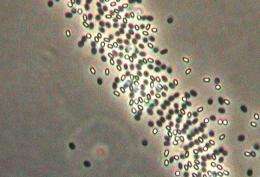Germination of Bacillus species which can lead to food poisoning

Some bacteria can form spores (survival capsules) that are particularly resistant to heat. Since sporogenous bacteria can also cause food poisoning and a reduction in food quality, they constitute a significant threat to the food industry.
If spores are to pose a risk, they have to "wake up" from a state of hibernation and return to their normal growth cycle through a process called germination. Irene Stranden Løvdal's doctoral research has studied the germination process in four different species of Bacillus. Her findings are of importance for the production and safety of foods with a long shelf-life.
Refrigerated foods with a shelf-life of several weeks are often heat-processed at temperatures between 65 – 95 C. This kills the majority of bacteria, but Bacillus spores can survive, germinate and develop into growing bacteria. Thermal treatment of this kind will in fact improve the growth potential of sporogenous bacteria because the heat kills competing bacteria flora and stimulates the surviving spores so that germination can commence more rapidly. The thermal treatment can increase the risk of spore germination in food and result in subsequent bacterial growth and a risk of quality deterioration and food poisoning.
Løvdal has investigated how the germination characteristics of the spores of four different Bacillus species are affected by heat treatment. She has used knowledge about the spores' response to temperature to experiment with a method which can reduce the spore level without increasing the overall thermal treatment of the food product.
The method, called double heat treatment, involved warming up the food first in order to activate the spores, then lowering the temperature to allow germination and then increasing the heat once more in order to kill the germinated spores. The effect of this procedure varied from food to food but in some cases, the level of spores was reduced by more than 99.9%.
Løvdal has also studied some of the more fundamental, genetic elements linked to the germination of spores belonging to the species B. licheniformis. Closely related, sporogenous bacteria have a genomic area called gerA. This codes for a receptor which registers the presence of specific nutrients (germinants) that can trigger germination. Løvdal discovered that this genomic area in B. licheniformis is important for germination processes initiated by amino acid germinants.
The doctoral research was carried out at The Norwegian School of Veterinary Science (NVH) and at Nofima in Stavanger. Researchers and fellows at The Norwegian Defence Research Establishment were also key collaborators.
More information: Irene Stranden Løvdal defended her doctoral thesis on 3rd February 2012 at The Norwegian School of Veterinary Science. The thesis is entitled: "Germination of Bacillus species related to food spoilage and safety”.
Provided by Norwegian School of Veterinary Science
















